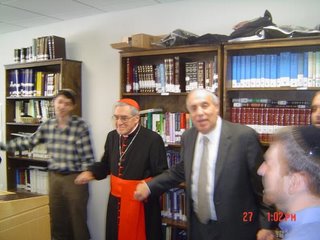Rabbi Eliyahu W. Ferrell gave me permission to post his response to Rabbi Darren Kleinberg's article, "
Reaching for perfection":
In Rabbi Kleinberg’s articles, we seem to read of a deity who is not the G-d of Judaism. Indeed, in all my adult years in yeshivos and in all of the years in my youth spent in non-Orthodox institutions, I never heard any Jew describe G-d the way Rabbi Kleinberg describes his god.
(1) The G-d of Judaism is good and wise beyond our capacity to imagine or describe. We state during every morning service, “Who among the supernal beings or the terrestrial beings can say to You [G-d], ‘What are You doing?’” We bless G-d as the True Judge after a bitter occurrence, affirming that He is correct in all that He does (see Talmud, Berachos 54/a and Shulchan Aruch, Orach Chaim 222:2). Rabbi Kleinberg seems to impugn G-d’s goodness: “How do we come to terms with a God that seemingly acts outside of the moral compass that our tradition (including the biblical tradition) passes down to us? What does it mean to attempt to live ‘in the image of God’ when that image is sometimes one that we wish to turn away from?...” [from "
Challenge of the text"]
As the great (truly) Modern Orthodox sage Rabbi Aharon Lichtenstein said, “I do not judge God. I assume, a priori, that ‘His deeds are perfect, for all His ways are just; a faithful God, without iniquity, righteous and upright is He’ (Deuteronomy 32:4). If He commands, ‘Take your son and offer him as a sacrifice,’ then it must be good (in a sense which perhaps, at the moment, I do not understand). But within the context of my a priori obedient submission, I may try to understand.”
(2) The G-d of Judaism is consummately perfect and all-knowing. He is unchanging—including growing from learning (Malachi 3:5; Jeremiah 23:24; Proverbs 15:3; Maimonidean Code 1:2-3, 1: 10-11, 2:9-10; Guide to the Perplexed 1:11, 3:13, 3:25; #10 of the 13 Faith Tenets). Rabbi Kleinberg—without any specific citations—seems to reject this description of G-d: “[T]he most fascinating aspect of the Torah [is] its depiction of God as less than perfect…And so it must be asked: ‘Did God not know that man would be alone?’ Is God not, after all, all-knowing (omniscient)? One answer that has been given to this question is that the Torah is teaching us a lesson that even God learns, and therefore, so should we…Another more mystical approach suggests that God is in a process of reaching perfection...”
(3) The Chosenness of the Jewish people by the G-d of Judaism has never in 33 centuries of religious Jewish thought been described as an error made by G-d. And never in 33 centuries has any religious Jewish thinker said that, in actuality, all of humanity is chosen. Precious, yes!—but not chosen. This is stated in unnumerable sources and is encapsulated in the Torah blessings recited every day and at every Torah-reading: “He chose us from all other nations and gave us His Torah.” In the holiday liturgy, this basic principle is also encapsulated: “You have chosen us from all other nations; You have loved us and been pleased with us.” Yet Rabbi Kleinberg dismisses this: “I would like to suggest that this idea - the idea that we Jews are the ‘Chosen People’ - is another example of a moment of imperfection in God's creation and decision-making…We must consider this awesome and wonderful privilege to be the inheritance of all peoples. There is no one who is exempt from this obligation. We have all been chosen.”
America grants freedom of speech. No one can stop Rabbi Kleinberg from expressing his opinions—but there are laws against false advertising. His articles are not representative of Orthodox Judaism.
I ask Rabbi Kleinberg to tell me if I have misunderstood him and to assert without ambiguity or obfuscation his belief that G-d never makes a mistake, never does anything immoral or unjust, and chose the Jewish people and only the Jews.
Rabbi Eliyahu W. Ferrell
Member, Talmud Faculty
Passaic Torah InstitutePassaic, NJ
Relevant links:- Rabbi Ferrell maintains the excellent
Einei HaEdah blog
Labels: divrei Torah, hashkafa




